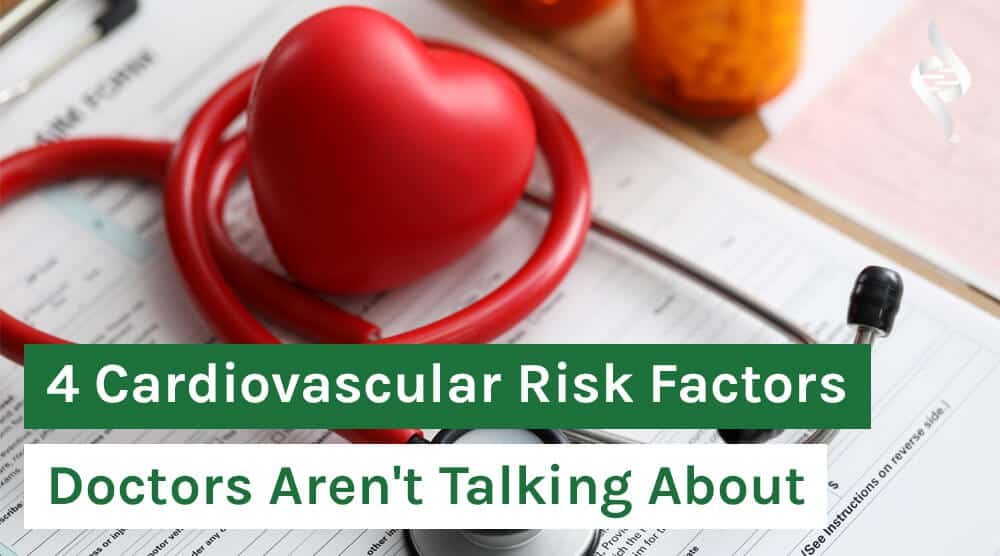4 Cardiovascular Risk Factors Doctors Aren’t Talking About
Video Transcript:
Happy Heart Health Awareness Month! I am going to share with you today four very important cardiovascular risk factors to be aware of that your doctors are not detailing fully that can literally change your life and can prevent heart disease, heart episodes like heart attacks, stroke, and all of the other assortment of imbalances in your heart health.
1. Too Much Sugar
So, the first cardiovascular risk that nobody’s really zeroing in on is that your sugar intake from both a dietary perspective and or your body’s natural production like insulin, is one of the greatest risks or risk factors that leads to breakdown of your cardiovascular health. And you might ask, “Dr. Melissa, how is that possible? I thought salt was the thing we’re supposed to be aware of,” and actually sugar is the worst. Out of any other element that influences the heart health, sugar is a direct leading source of cardiovascular imbalances. And I would gauge to state that it’s one of the number-one factors in terms of individuals who might be experiencing pre-diabetic states or consuming your standard American diet that have insulin imbalances.
So, if you are looking to get control of your heart health, be preventive, or reverse some of the staging of heart disease and heart cardiovascular imbalances, really understanding your blood sugar levels and your daily hourly insulin levels is going to be critical.
You might see a lot of people now have these patches that they put on their arm and it connects up to their phone where they can literally track after I eat a meal, insulin either spikes or stays maintained. Everybody’s biochemistry is different and so it’s really important to be able to track your blood sugar as well as the insulin on a not just morning fasting basis like we usually see in lab tests, but throughout the day. And there are influences, and particularly number four in this video for you is going to highlight this further.
2. Magnesium Deficiency
So number two, the second cardiovascular risk is deficiencies in magnesium. Last year, I talked about magnesium, our Magnesium 7, and the connection to heart health, but it’s really, really important to know that over 95% of individuals here on earth are lacking in some degree of magnesium.
There are different types of magnesium. There are certain forms of magnesium that are better for your heart health. There are others that are more productive for minimizing fluid retention, which can be really helpful if folks have chronic vascular insufficiency or have assorted fluid retention related to heart failure.
But there’s also other magnesiums that are really good for your heart tissue. Magnesium, most importantly, when it comes to your overall cardiovascular health, when we have optimal, not just normal in the middle range, but optimized high level, in the range but optimized magnesium, we minimize the body’s accumulation of plaque, particularly bone matter in our cardiovascular system.
For anybody who’s had a family member that has suffered from arterial sclerosis, that’s a thickening or hardening of the arteries. The thickening and the hardening that narrows the walls of that artery, it’s bone matter, and so magnesium minimizes calcium from getting into your cardiovascular system. That is absolutely critical.
3. Not Exercising Every Day
Number three, as far as cardiovascular risks, are individuals who are not doing daily cardio. This is really important. Exercise is important. 30 minutes minimum of cardiovascular effect where you’re getting your heart rate, you’re getting a sweat on – brisk walking, swimming, even rebounding for 30 minutes is really great. But not doing that every day is a risk factor.
So, I have a lot of folks that are fitness enthusiasts, they’re in the gym, and individuals that may be only lifting weights and not doing cardio or they’re not doing the HIIT and the intensity, getting the blood pumping that might not qualify as cardio specifically.
4. Neglecting Stress Levels
Now number four, this is really important. The really, really key critical factor for minimizing both stress levels in your body, the cortisol hormone, as well as minimizing the spikes of insulin or imbalances in blood sugar, is getting control of the stress hormone. So, high blood pressure, elevated heart rate, high cholesterol, and even elevations in triglyceride levels, all are contributed to an increased cortisol level.
So, cortisol is our stress hormone that our adrenals produce. This is a fight-or-flight stress response mechanism. And cortisol is a natural, innate hormone that helps us either get our bodies ready to fight or flight, to run, and that activity naturally requires a spike of energy. So, insulin increases, which is bad for the heart, talked about that first, but it’s also going to trigger a central nervous system response, elevation in blood pressure, elevation in heart rate and cortisol is clogging and overwhelming to your liver, which leads to increases in triglycerides and cholesterol.
So, the traditional model is to combat cholesterol by giving you a statin drug. But what that doesn’t address is the source, which is stress hormone called cortisol. I do a lot of cortisol testing with my patients. We actually do saliva-based testing. You can get a four-panel snapshot throughout the day, gives us a really good idea of this ideal cycle, very much like our circadian cycle, but cortisol management and keeping cortisol calm and in the levels we need at certain times of the day can really turn around the state of your heart health.
So, those are four powerful risk factors that many people, especially your clinicians, are not discussing that I know will literally change the state of your heart health, will help prevent heart disease, and might save you or maybe a family or friend’s life. So, I’m excited to share this information with you today.
Magnesium deficiency is linked to stress, diabetes, heart disease, osteoporosis, chronic fatigue syndrome, depression, anxiety, trouble sleeping, sore muscles, migraines, and many more debilitating health conditions.
If your body needs magnesium, you want the most beneficial kind your body can actually absorb. Organixx Magnesium 7 gives you seven (7) of the very best, most bioavailable types of elemental magnesium available.







I didn’t see recommendations for keeping your cortisol level in check?
What if taking 500 mg Magnesium makes you have diarrhea? I have tried it a couple different times and found it gives me stomach trouble. I already take zinc at night for help staying asleep, but thought I should add magnesium because I had heard these two together will help with overall better sleep.
just got it and intend to take every day
What if taking 500 mg Magnesium makes you have diarrhea? I have tried it a couple different times and found it gives me stomach trouble. I already take zinc at night for help staying asleep, but thought I should add magnesium because I had heard these two together will help with overall better sleep. Sorry for the sublimate post, my email was submitted incorrectly.